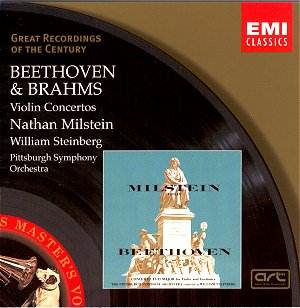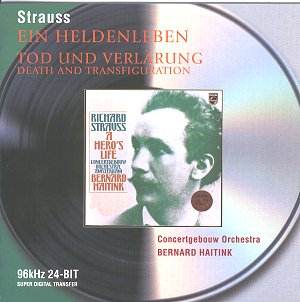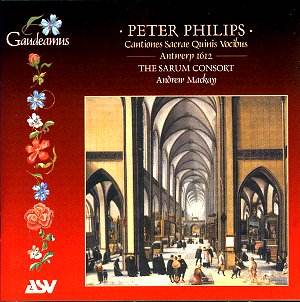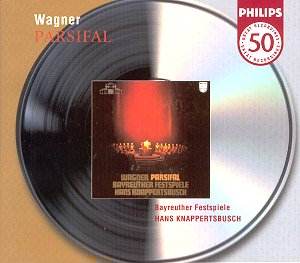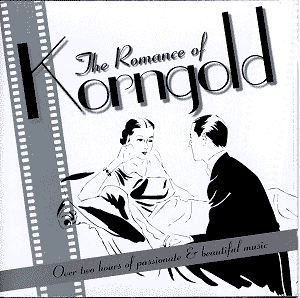 Composer: Erich Wolfgang Korngold (1897-1957)
Composer: Erich Wolfgang Korngold (1897-1957)
Works: Romance of Korngold: Much Ado About Nothing, Escape Me Never, The Adventures of Robin Hood, The Prince and the Pauper, Der Schneeman, Baby Serenade, Symphony (extract), Das Wunder der Heliane, Between Two Worlds, Symphonic Serenade, Die tote Stadt, Passover Psalm, String Quartet No. 2 in E Flat (extract), Songs of the Clown, Concerto for Violin and Orchestra
Performers: Gil Shaham (violin), London Symphony Orchestra/André Previn, John Mauceri, Flesch Quartet, Caspar Richter/Linz Orchestra, RSO Berlin, Anne Sofie von Otter (mezzo-soprano), Bengt Forsberg (piano), Matthias Goerne (baritone), Anna Tomowa-Sintow (soprano)
Recording: Various 1991-2000
Label: Deutsche Grammophon (DG 461 834-2)
Erich Wolfgang Korngold’s music occupies a unique niche within the 20th-century classical canon, straddling the line between the lush Romanticism of his youth and the more avant-garde tendencies of his later life. The “Romance of Korngold” offers a fascinating panorama of his output, showcasing the composer’s ability to weave sentimentality with dramatic flair across various genres, from opera to film. This two-CD set compiles a rich selection of his works, revealing not only his melodic prowess but also his intricate orchestration, which remains distinctively characteristic, often echoing the emotional depth of his operatic endeavors.
The performances on this collection vary in their interpretive approaches, reflecting the diverse ensemble of artists engaged in the project. John Mauceri’s contributions, particularly in the excerpts from “The Adventures of Robin Hood,” reveal a tendency toward a softer articulation, which at times leads to a somewhat languid interpretation. While this approach may enhance the romantic allure of the music, it occasionally sacrifices the rhythmic vitality that is crucial to maintaining engagement. Conversely, André Previn’s direction with the London Symphony Orchestra captures the textural clarity and incisive energy essential to Korngold’s music, especially in the chamber interlude from “Much Ado About Nothing,” where the ensemble’s responsiveness showcases a palpable sense of playfulness.
The sound quality across the recordings is commendable, with Deutsche Grammophon’s engineering capturing the lush orchestration of Korngold’s work in a vibrant soundscape. The recordings, dating from 1991 to 2000, demonstrate a refinement in audio fidelity that allows the intricate interplay of orchestral colors to emerge. Particularly noteworthy is the clarity of the strings in the “Symphonic Serenade,” where the Allegro moderato evokes the exuberance found in Dvořák’s serenades, but with Korngold’s distinctive harmonic language that hints at the dissonances that were to characterize later modernism.
Gil Shaham’s performance of the Violin Concerto is a highlight of the set, characterized by an aristocratic tone that marries youthful exuberance with refinement. His command over the rapid flourishes at the conclusion of the Moderato is nothing short of exhilarating, offering a contrast to the more restrained interpretations of other violinists, such as Ulf Hoelscher. Shaham’s phrasing and emotional engagement bring a fresh perspective to this work, making it a definitive interpretation that stands out in the burgeoning discography of Korngold’s concerto.
The vocal offerings are equally compelling, with Anne Sofie von Otter’s nuanced interpretation of “Songs of the Clown” demonstrating a mastery of English text setting that is both charming and profound. Her collaboration with Bengt Forsberg provides an ideal balance, enhancing the clarity of the performance. Matthias Goerne’s “Mein Sehnen, mein Wahnen” from “Die tote Stadt” showcases his ability to navigate the lyrical contours of the music with an intensity that is both introspective and expansive, aligning beautifully with the German romantic tradition.
This collection, while not a comprehensive representation of Korngold’s oeuvre, delves deeply into the emotive and stylistic core of his compositions. It presents a rich tapestry of orchestral and vocal works that reveal the complexities of his musical language, characterized by lush harmonies and poignant melodies. For those seeking to explore the dreamy yet intricate world of Korngold, this set serves as an engaging and illustrative portrait of a composer who skillfully bridges the worlds of concert hall and cinema.
